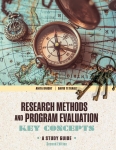RESEARCH AND PROGRAM EVALUATION KEY CONCEPTS: A STUDY GUIDE

ISBN-13: 978-1-945628-24-5
# pages: 205
Copyright Year: 2017
Suggested Retail: $37.95
Description
Research Methods and Program Evaluation Key Concepts: A Study Guide unlocks the complexity of three domain areas: (1) research methodologies, (2) program evaluation, and (3) statistics. The study guide provides an overview of primary key concepts in each domain and includes understandable definitions and examples. The text also provides the research student with an understanding of the philosophical underpinnings of different approaches to research, such as quantitative and qualitative research. Critical thinking skills are enhanced by an interactive reading of the text. Each chapter facilitates these skills with “the thinker,” inviting the student to contemplate a particular concept. This helps bridge the gap between understanding of key concepts and application to the students’ own research and potential practice. Enjoy using the keys in this guide to unlock the complexity of research methods concepts.
Table of Contents
UNIT ONE OVERVIEW OF THE RESEARCH PROCESS
CHAPTER 1 Scientist Practitioner Model 3
CHAPTER 2 Research Methods 9
CHAPTER 3 The Seven Step Literature Research Process 15
CHAPTER 4 Sampling Procedures 25
UNIT TWO QUALITATIVE AND DESCRIPTIVE METHODS
CHAPTER 5 Research Ethics 33
CHAPTER 6 Assessments 41
CHAPTER 7 Qualitative Methods and Mixed Methods 47
CHAPTER 8 Descriptive Methods 71
UNIT THREE DESCRIPTIVE STATISTICS
CHAPTER 9 Descriptive Statistics Overview 77
CHAPTER 10 Scales of Measurement 87
CHAPTER 11 Frequencies 91 UNIT FOUR INFERENTIAL STATISTICS (PART 1)
CHAPTER 12 Overview of Inferential Statistics 99
CHAPTER 13 Hypothesis Testing 107
CHAPTER 14 Type I and Type II Errors 117
CHAPTER 15 Statistical Power 123
UNIT FIVE INFERENTIAL STATISTICS (PART 2)
CHAPTER 16 Parametric Tests: T-Tests for Correlated Groups 131
CHAPTER 17 Parametric Tests: T-Tests for Independent Groups 135
CHAPTER 18 Nonparametric Tests 139
UNIT SIX EXPERIMENTAL AND QUASI-EXPERIMENTAL DESIGNS CHAPTER 19 Experimental Design Logic and Selecting the Right Research Design 147
CHAPTER 20 Quasi-Experimental Design 159
CHAPTER 21 Ex Post Facto Design 171 UNIT SEVEN CORRELATIONAL METHODS
CHAPTER 22 Correlational Procedures and Types of Correlations 177
CHAPTER 23 Prediction and Correlation 181
UNIT EIGHT PROGRAM EVALUATION OVERVIEW
CHAPTER 24 Program Evaluation 189
References 201
About the Author(s): Anita Knight/David Tetrault
Anita Maria Knight, Ph.D. is Associate Professor of Counseling and a Licensed Professional Counselor (LPC) in the Department of Counselor Education and Family Studies at Liberty University. She teaches in the CACREP accredited clinical mental health counseling program and is the first place recipient of the Chancellor’s Award for Teaching Excellence. Knight earned her doctorate in Counselor Education and Supervision and her M.A. in Community Counseling from Regent University. Knight is also a certified as a highly reliable coder of the Adult Attachment Interview (AAI) through Mary Main and Eric Hesse’s UC Berkeley AAI coder certification program.
David Edward Tetrault, Ph.D., MDiv. is an Assistant Professor of Counseling in the Department of Counselor Education and Family Studies at Liberty University in the Masters in Professional Counseling Program. Tetrault earned a doctorate in Professional Counseling from Liberty University and a Master of Divinity from Gateway Seminary. Tetrault also serves as a chaplain at Banner University Medical Center.

